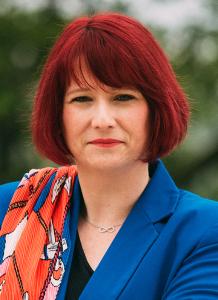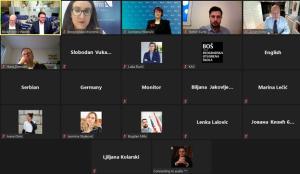PolitiKAS Debate: New Normal - Foundation Office Serbia / Montenegro
Online-Seminar
Details
The debate on the “Public Hearing as an Institution of Parliamentary Practice” was held on Tuesday, 9th March 2021. Marian Wendt, Member of the German Bundestag and Chairman of the Petitions Committee, Hans Démoed, chairman of the CDA Rijnland and representative of the Eduardo Frei Foundation and Zoran Krstić, full professor at the Faculty of Political Sciences spoke about the significance, about concrete benefits of this practice, about best practice examples from Germany and Holland and about the reasons for insufficient use of this practice in Serbia. The debate was moderated by Stefan Surlić, Assistant at the Faculty of Political Sciences.
In his introductory speech the Director of the Konrad Adenauer Foundation for Serbia and Montenegro Norbert Beckmann-Dierkes pointed out that a functioning democracy requires debates and that this topic is very important for the development of the parliamentary democracy in Serbia. “The public hearing is an instrument which helps build a more open, transparent and more democratic parliament. I believe that for successful development and implementation of this parliamentary practice in Serbia the European democratic experience is of great importance. Germany and the Netherlands have a long and rich tradition of using this practice in providing the participation of citizens in the parliamentary life and in political processes”, Norbert Beckmann-Dierkes said.
Public Hearings in Germany
Speaking from the German perspective, Marian Wendt said that there are many forms of the public hearing in the German Bundestag and that they cover three important areas. “One of the areas is the classic hearing during the presentation of draft laws. Almost 80% of all laws which are discussed in the Bundestag are subject to the public hearing. These discussions include experts, lawyers and other interested parties as well as those who are critical towards the draft law. There are also committees of inquiry in the Bundestag, which aim to inquire certain topics. This type of committee discusses different contracts concluded by ministers thus controlling the government. Complaints are in Germany a constitutional right and in the Bundestag citizens can lodge a complaint if they have 50,000 signatures. The person who submits a complaint is invited to the German Bundestag to participate in a conversation about the lodged complaint. This instrument is also being used outside of the parliamentary work in order to introduce certain processes into the German Bundestag and in order to get the attention of the public”, Wendt said.
Public Hearings in the Netherlands
When presenting the current political situation in the Netherlands Hans Démoed pointed out that the results of a public hearing caused the government in the Netherlands to fall. “We had a very serious political situation in the Netherlands in January. A committee of parliament members had an investigation which resulted in a public hearing which had the purpose to control the work of the tax authorities. As the result of that public hearing it was established that there are many families in the Netherlands who experienced huge financial problems because they were wrongly accused of fraud by the tax authority. That became a matter for a public hearing and the result was that the government resigned.”
In the Netherlands the public hearing is an instrument for gathering expertise, not only at the national but also at the local level. “At the local level public hearings are organized on topics which are important to the citizens at the local level. Local councillors are organising public hearings with groups of interested citizens in order to inform them, to introduce an expertise and finally to make decisions which will influence the improvement of the citizens’ living conditions”, Démoed concluded.
Public Hearings in the Parliamentary Practice in Serbia
Dr. Zoran Krstić spoke about the problems, deficiencies and also recommendations for the improvement of the mechanism of public hearings in the Parliament of Serbia. He pointed out that “one of the most important competencies of the parliament, especially in systems which have not been sufficiently institutionally established yet as in the case of the political system in Serbia, is the control of competencies. The main intention of organized public hearings is to solve a certain problem through a discussion, by gathering information which the parliamentary committees will use in their work. With the adoption of the Law on the National Parliament in 2010 the public hearings became part of our legal and institutional system”. Professor Krstić identified three key challenges which hinder the true and real function of this instrument. One of the problems is the untimeliness in which the government, i.e. the executive power sends draft laws to the parliament, which makes it for the parliament members impossible to prepare adequately for the discussions about the draft laws. A great challenge represents also the notion that the parliament members have about the usefulness of this instrument for their work. The main problem lies in the fact that the parliament members are not sufficiently familiar with all of the ways in which the public hearings can be used and thus also with the effects that can be reached by using them. That leads to the biggest problem and that is the frequency of public hearings. “For more than half of the draft laws public hearings are not organized, which means that more than half of the laws are adopted without a public hearing and this practice needs to change”, Professor Krstić said.
Recommendations for the Strengthening of Capacities of the Public Hearing Practice in the Parliament of Serbia
The conclusion of the debate was that it is necessary to work on strengthening and expanding the number of participants in the public hearings, it is necessary to accept recommendations coming from the civil sector and it is necessary to pay attention to the role and position of non-government organisations in this process. It is also necessary to inform all stakeholders about the planned public hearing at least a month prior to the planned date of the public hearing. This will make its effects be better since all of the participants will be informed about the topic of the debate in due time and they will have enough time to prepare.




